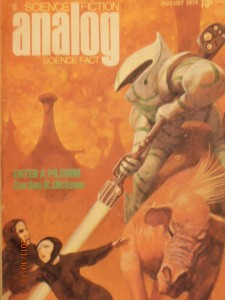The first Jack Vance I read was his juvenile novel Vandals of the Void, published in 1953 by Winston. I encountered it–some years later–in the library of a school in rural Indiana. I was in the fifth grade, I’d just discovered science fiction, and I was plowing through everything the library had.
Authors’ identities did not yet mean anything to me, so I didn’t associate the name “Jack Vance” with the story I reread several times and remembered long afterward for certain vivid scenes and images: a perilous descent into a lunar crevasse, a mysterious glowing-eyed villain.
I don’t recall just when I realized that the Jack Vance whose work I’d come to seek out, the author of The Dying Earth and “The Last Castle” and “The Dragon Masters,” was also the author of that long-ago story. I do remember that once, not long out of grad school, I wanted to buy a copy of Vandals of the Void and discovered that they were hard to get and too expensive for me. (Just now I saw that the first edition is selling for $200+ online.) So I ordered it from the long-suffering, ever-helpful Interlibrary Loan Department of the Philadelphia Free Library (thanks, Ben Franklin!) and illegally photocopied it. I reread those pages every so often over the years; I have them in a file folder in my office now.
Also in my office are all the various editions of Vance’s works I’ve accumulated over the years. They have survived even the most drastic of the bookshelf purges. Among them are eight battered, fragile issues of F&SF from the early 1970s, when the magazine serialized several Vance novels.
And now two additions to the shelves.
This week I received one-third of the Complete Jack Vance, now being published in six hardcover volumes by Afton House Books. This is a compact version of the famous VIE edition of a few years ago, about which I unaccountably failed to hear at the time. My newly acquired books are too large and heavy to read in bed, lest a broken nose result from an inadvertent dropping-off, but they are sturdy and handsome and meant to last a while. What glee I feel as I contemplate all those pages of wit, style, color, and elegant ferocity.
The VIE editors tried to restore Vance’s texts to something close to the author’s originals or intentions. Big Planet, for example, now contains some passages deleted as too racy by the editor/publisher. It will be a pleasure to read these much-loved works in texts that are, in many small ways, new. And it will be a treat to read those of Vance’s mysteries that I haven’t yet read.
Of course I won’t be getting rid of any of the old Vance editions. I’ll just have to annex more shelf space.

 “In story after story,” Bova points out, “science-fiction writers tacitly assume that this entire planet will eventually be united into a single world government”–if not by the end of the 20th century, then soon. He lists the reasons why people and nations will resist that unification, then argues that it will come about someday if for no other reason than resource control.
“In story after story,” Bova points out, “science-fiction writers tacitly assume that this entire planet will eventually be united into a single world government”–if not by the end of the 20th century, then soon. He lists the reasons why people and nations will resist that unification, then argues that it will come about someday if for no other reason than resource control. 